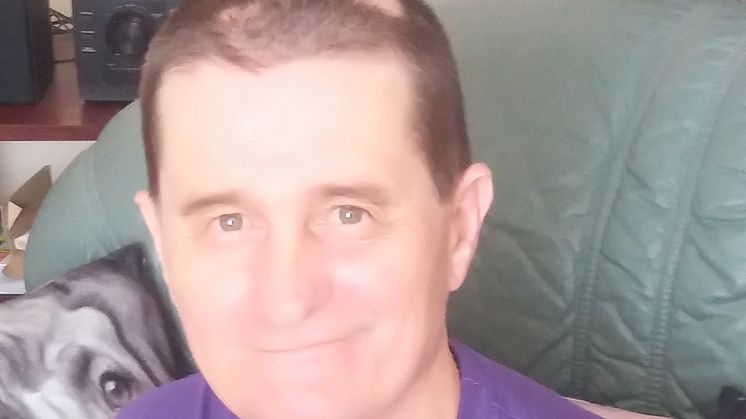
Press release -
Plymouth stroke survivor finds his voice
Plymouth resident Kevin Hockin, 55, is on the road to recovery after a stroke left him unable talk in 2012.
Kevin was working for a road maintenance company sitting in his lorry when he suddenly lost control of his right arm and leg. Kevin woke up in hospital not knowing where he was or what had happened. He couldn’t walk, write, talk, or even remember his own name.
Despite his stroke, Kevin has been determined to find new ways to communicate again. With support from the Stroke Association, Kevin’s speech is improving. He has recently become a volunteer and ambassador for the charity to help raise awareness of its work around the region.
Kevin said: “Life is completely different since my stroke but I’m not going to let it beat me. You get your good and bad days, and it can be isolating, frustrating and frightening, but it can also be fulfilling. I take my recovery one day at a time.
“I’m grateful for the Stroke Association for their help and support. I hope to continue with the volunteering I am doing to ensure more people are aware of stroke and the communication difficulties some people live with after it has happened’
Kevin is one of more than 350,000 people in the UK with aphasia, a communication disability which can affect people’s ability to speak, read, write, use numbers and understand but not their intelligence. Aphasia is caused by stroke, head injury or other neurological conditions.
Kevin says that one of the biggest challenges is that many people do not know enough about aphasia or how they can help people with the communication disability. On many occasions people have thought Kevin is drunk and dismissed him, and he’s even been laughed at for the way he speaks on a bus journey.
Caroline Shepherd, Information Advice and Support Coordinator at the Stroke Association, said: “I am really proud of Kevin and all that he has and continues to achieve. He is such an inspiration to everyone that meets him. He is full of passion and courage. We are so privileged to know him and have him as part of the Plymouth team of volunteers.
“Having aphasia can be so frustrating because many stroke survivors know what to say, but are unable to make themselves understood. Seemingly ordinary tasks like buying a pint of milk or using money can feel very stressful, and it is easy to lose confidence. Many people with aphasia can feel very isolated as a result.
“If people working in shops, cafes, banks and a huge variety of other customer service roles know about the disability and follow a few of our simple tips, the barriers to communication can be start to be broken down.”
The Stroke Association is raising awareness of aphasia and how people in the community can help support stroke survivors affected by the condition. To support this campaign, you can go to stroke.org.uk/aphasia or search for #aphasia on social media.
More than 350,000 people in the UK have aphasia, a communication disability caused by stroke. Throughout aphasia awareness month [June], the Stroke Association is raising awareness of aphasia, and how people in the community can help support stroke survivors affected by the condition. The charity has produced this film to help people with aphasia find their voice.
To find out more about local stroke services in Plymouth contact Caroline Shepherd on 01752 674580 or Caroline.Shepherd@stroke.org.uk
Related links
Topics
A stroke is a brain attack which happens when the blood supply to the brain is cut off, caused by a clot or bleeding in the brain. There are around 152,000 strokes in the UK every year and it is one of the largest causes of disability. There are over 1.2 million people in the UK living with the effects of stroke.
Stroke Association is a charity. We believe in life after stroke and together we can conquer stroke. We work directly with stroke survivors and their families and carers, with health and social care professionals and with scientists and researchers. We campaign to improve stroke care and support people to make the best recovery they can. We fund research to develop new treatments and ways of preventing stroke. The Stroke Helpline (0303 303 3100) provides information and support on stroke. More information can be found at www.stroke.org.uk










